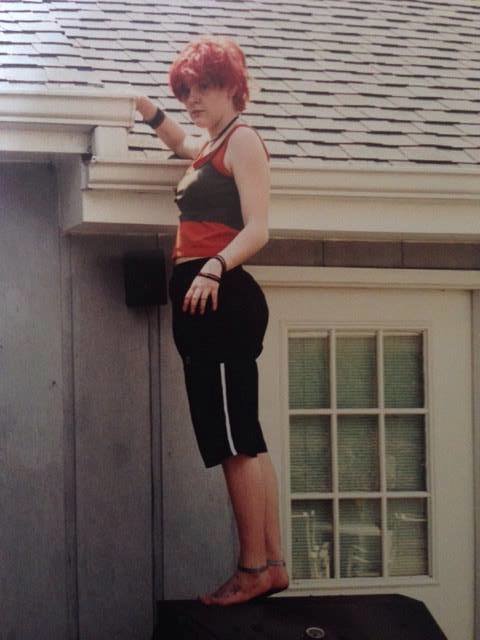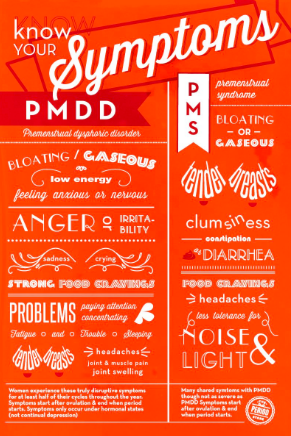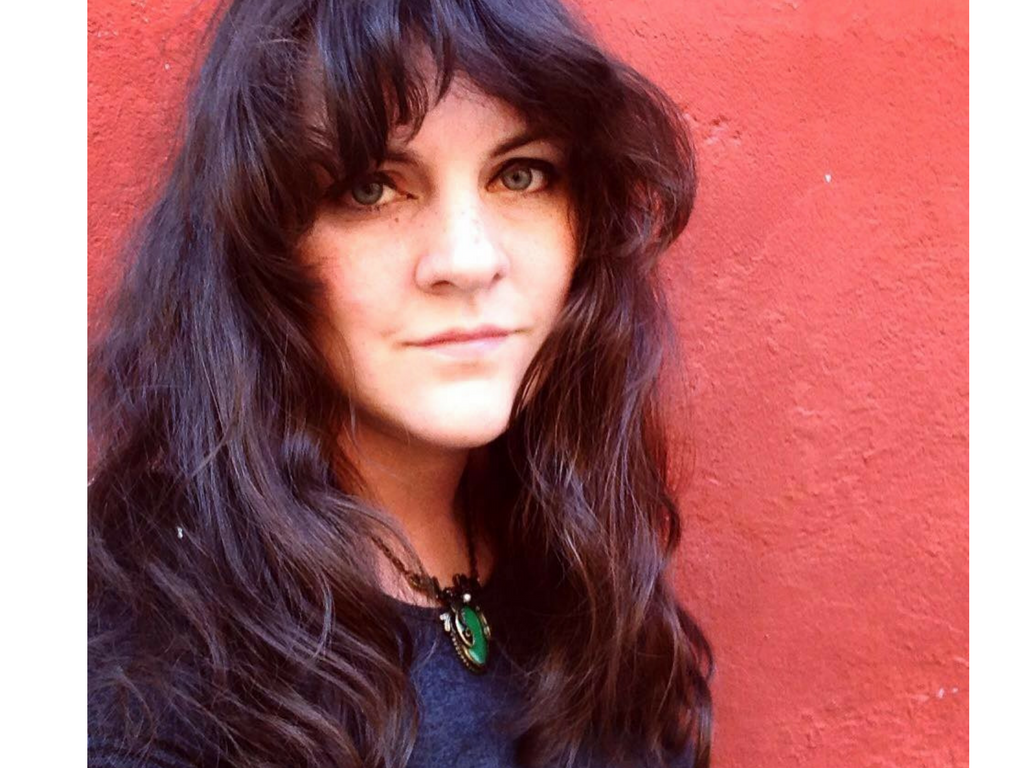Meghan O’Dea as a teenager – Meghan O’Dea
I remember being 10-years-old and flipping through a catalogue full of Grateful Dead memorabilia, “South Park” plushies, and Metallica t-shirts. One sticker in the catalogue read “Never trust anything that bleeds for seven days and doesn’t die.”
What could bleed for seven days and not die? I imagined magical beasts — unicorns, rare salamanders, bewitched deer — that might answer the riddle. I finally solved it four years later when I got my first period.
My period came slowly at first — but after the first year, the pain from my period forced me to take days off from school. I used to lay in the bathroom floor and cry so long I’d run out of tears. The cramps felt like rats were trying to gnaw their way out of my womb. I couldn’t believe I’d actually looked forward to this*.*
Life wasn’t ideal, but it wasn’t bad enough to warrant these ideations. The clinical depression I’d been diagnosed with in high school lasted longer than this, but I also knew the depression is often situational in nature and tied to events in my life that are hard to cope with.
These spells had a different rhythm. I suspected they had some connection to my menstrual cycle, so I began tracking the onset and retreat of depression. After two months, my doctor confirmed that PMS went beyond the usual bloating and irritability for me — it explained my week-long stretches of depression and thoughts of suicide.
She diagnosed me with premenstrual dysphoric disorder (PMDD), a clinical-grade PMS that affects between 3% and 8% of menstruating women, according to the American Academy of Family Physicians.
At first, I struggled with my diagnosis. It seemed to confirm every misogynistic joke I’d ever heard about women on their periods. When it comes to periods, learning about blood, pain, and endurance and the way the world sees women has often gone hand-in-hand. There’s an episode of “Roseanne” I recall from when I was a little girl where Dan Connor is torn between enjoying his birthday and dodging his wife’s pre-menstrual mood swings.
As political science scholar Lauren Rosewarne pointed out in “Periods in Pop Culture: Menstruation in Film and Television,” in an episode of “Everybody Hates Raymond,” Ray Romano asked his wife if she’s on her period because she is more emotional than usual, craves pizza, and wants to watch a movie with her husband.
In 2008, Bill O’Reilly asked a guest what the downsides of a female president could be. “You mean besides the PMS and the mood swings, right?” his guest responded.
In 2012, female representatives in Michigan were banned from using the word “vagina” on the House floor.
Last year, presidential candidate Donald Trump attempted to discredit Fox News host Megyn Kelly by accusing her of being emotionally-unstable because of her period. “She starts asking me all sorts of ridiculous questions,” Trump said, “and you could see there was blood coming out of her eyes, blood coming out of her … wherever.”
Lauren Rosewarne noted that “by attributing women’s undesirable emotions to menstruation, the woman gets undermined based on her biology. By associating irrational, out of control, out of proportion feelings with femininity, we can infer that her ‘bad’ behavior is attributable to her biology and thus is…permanent, and enduringly problematic.”
At best we have Roseanne and Romano’s suggestion that female characters who are PMSing have alter egos that rear their ugly heads once a month. At worst, we get comments like Trump’s that suggest women on their periods can’t effectively do their jobs.
It’s a no-win scenario.
Did having PMDD mean that my period really does make me a crazy bitch? I kept thinking back to Galen’s theory of the wandering womb. For centuries, uteri were thought to move freely within the female body, strangling other organs and causing a variety of ailments.
I thought of all the women institutionalized for hysteria, a vague condition which physicians used for hundreds of years to police women’s emotions and sexual desires. The person I should trust the least is myself if we’re not supposed to trust anything that bleeds for seven days and doesn’t die.
Grappling with PMDD filled me with self-doubt and fragility, which I hadn’t dealt with since I’d ended an abusive relationship in my early twenties. I’d dated a man who liked initiating coercive sex, making troll-ish sandwich jokes, and gaslighting me at every turn.
It took five years for me to finally admit that he’d sexually assaulted me the last time we saw each other. I realized that I’d been a textbook example of how rape victims cope with and minimize their experiences. To top it all off, I’d been diagnosed with PMDD while working toward that truth.
My doctor recommended getting an IUD to curtail those awful monthly plunges into depression. It has done its job: Most months I don’t have a period, so I’ve stopped feeling the symptoms of PMDD. Instead of feeling isolated by depression, physical pain, a heavy flow, and past trauma, I began to think of my body again in terms of what it could accomplish, rather than how I might escape it, the ways it might inconvenience or hurts me, or how it might be harmed by others.
The IUD has given me a new sense of control over my body.
A few months after I had the IUD implanted, I gave a Pecha Kucha talk in my hometown on the sexist myth of the crazy ex-girlfriend.
I ended my talk by reclaiming and reframing the conversation.
“Bitches aren’t crazy,” I told the crowd, “bitches are awesome.” After the talk, I saw a flyer for the event with “bitches are awesome!” written on it and a smiley face. Not only had my words resonated with someone else in the crowd, but that person wanted to make them tangible, to keep that message out there even after the event ended. I felt less alone, and someone else did too.
We’d started a conversation that night, instead of keeping quiet about something we’ve been told since childhood should be private.
I think I got it right at 10-years-old. A woman who bleeds for seven days and doesn’t die isn’t untrustworthy. She’s strong. She’s tough. She, like me, is magical.





title: “Pmdd Taught Me So Much About How We Treat Women Who Have Periods” ShowToc: true date: “2024-09-05” author: “Paul Rowe”
Meghan O’Dea as a teenager – Meghan O’Dea
I remember being 10-years-old and flipping through a catalogue full of Grateful Dead memorabilia, “South Park” plushies, and Metallica t-shirts. One sticker in the catalogue read “Never trust anything that bleeds for seven days and doesn’t die.”
What could bleed for seven days and not die? I imagined magical beasts — unicorns, rare salamanders, bewitched deer — that might answer the riddle. I finally solved it four years later when I got my first period.
My period came slowly at first — but after the first year, the pain from my period forced me to take days off from school. I used to lay in the bathroom floor and cry so long I’d run out of tears. The cramps felt like rats were trying to gnaw their way out of my womb. I couldn’t believe I’d actually looked forward to this*.*
Life wasn’t ideal, but it wasn’t bad enough to warrant these ideations. The clinical depression I’d been diagnosed with in high school lasted longer than this, but I also knew the depression is often situational in nature and tied to events in my life that are hard to cope with.
These spells had a different rhythm. I suspected they had some connection to my menstrual cycle, so I began tracking the onset and retreat of depression. After two months, my doctor confirmed that PMS went beyond the usual bloating and irritability for me — it explained my week-long stretches of depression and thoughts of suicide.
She diagnosed me with premenstrual dysphoric disorder (PMDD), a clinical-grade PMS that affects between 3% and 8% of menstruating women, according to the American Academy of Family Physicians.
At first, I struggled with my diagnosis. It seemed to confirm every misogynistic joke I’d ever heard about women on their periods. When it comes to periods, learning about blood, pain, and endurance and the way the world sees women has often gone hand-in-hand. There’s an episode of “Roseanne” I recall from when I was a little girl where Dan Connor is torn between enjoying his birthday and dodging his wife’s pre-menstrual mood swings.
As political science scholar Lauren Rosewarne pointed out in “Periods in Pop Culture: Menstruation in Film and Television,” in an episode of “Everybody Hates Raymond,” Ray Romano asked his wife if she’s on her period because she is more emotional than usual, craves pizza, and wants to watch a movie with her husband.
In 2008, Bill O’Reilly asked a guest what the downsides of a female president could be. “You mean besides the PMS and the mood swings, right?” his guest responded.
In 2012, female representatives in Michigan were banned from using the word “vagina” on the House floor.
Last year, presidential candidate Donald Trump attempted to discredit Fox News host Megyn Kelly by accusing her of being emotionally-unstable because of her period. “She starts asking me all sorts of ridiculous questions,” Trump said, “and you could see there was blood coming out of her eyes, blood coming out of her … wherever.”
Lauren Rosewarne noted that “by attributing women’s undesirable emotions to menstruation, the woman gets undermined based on her biology. By associating irrational, out of control, out of proportion feelings with femininity, we can infer that her ‘bad’ behavior is attributable to her biology and thus is…permanent, and enduringly problematic.”
At best we have Roseanne and Romano’s suggestion that female characters who are PMSing have alter egos that rear their ugly heads once a month. At worst, we get comments like Trump’s that suggest women on their periods can’t effectively do their jobs.
It’s a no-win scenario.
Did having PMDD mean that my period really does make me a crazy bitch? I kept thinking back to Galen’s theory of the wandering womb. For centuries, uteri were thought to move freely within the female body, strangling other organs and causing a variety of ailments.
I thought of all the women institutionalized for hysteria, a vague condition which physicians used for hundreds of years to police women’s emotions and sexual desires. The person I should trust the least is myself if we’re not supposed to trust anything that bleeds for seven days and doesn’t die.
Grappling with PMDD filled me with self-doubt and fragility, which I hadn’t dealt with since I’d ended an abusive relationship in my early twenties. I’d dated a man who liked initiating coercive sex, making troll-ish sandwich jokes, and gaslighting me at every turn.
It took five years for me to finally admit that he’d sexually assaulted me the last time we saw each other. I realized that I’d been a textbook example of how rape victims cope with and minimize their experiences. To top it all off, I’d been diagnosed with PMDD while working toward that truth.
My doctor recommended getting an IUD to curtail those awful monthly plunges into depression. It has done its job: Most months I don’t have a period, so I’ve stopped feeling the symptoms of PMDD. Instead of feeling isolated by depression, physical pain, a heavy flow, and past trauma, I began to think of my body again in terms of what it could accomplish, rather than how I might escape it, the ways it might inconvenience or hurts me, or how it might be harmed by others.
The IUD has given me a new sense of control over my body.
A few months after I had the IUD implanted, I gave a Pecha Kucha talk in my hometown on the sexist myth of the crazy ex-girlfriend.
I ended my talk by reclaiming and reframing the conversation.
“Bitches aren’t crazy,” I told the crowd, “bitches are awesome.” After the talk, I saw a flyer for the event with “bitches are awesome!” written on it and a smiley face. Not only had my words resonated with someone else in the crowd, but that person wanted to make them tangible, to keep that message out there even after the event ended. I felt less alone, and someone else did too.
We’d started a conversation that night, instead of keeping quiet about something we’ve been told since childhood should be private.
I think I got it right at 10-years-old. A woman who bleeds for seven days and doesn’t die isn’t untrustworthy. She’s strong. She’s tough. She, like me, is magical.





title: “Pmdd Taught Me So Much About How We Treat Women Who Have Periods” ShowToc: true date: “2024-10-21” author: “Gabriela Artrip”
Meghan O’Dea as a teenager – Meghan O’Dea
I remember being 10-years-old and flipping through a catalogue full of Grateful Dead memorabilia, “South Park” plushies, and Metallica t-shirts. One sticker in the catalogue read “Never trust anything that bleeds for seven days and doesn’t die.”
What could bleed for seven days and not die? I imagined magical beasts — unicorns, rare salamanders, bewitched deer — that might answer the riddle. I finally solved it four years later when I got my first period.
My period came slowly at first — but after the first year, the pain from my period forced me to take days off from school. I used to lay in the bathroom floor and cry so long I’d run out of tears. The cramps felt like rats were trying to gnaw their way out of my womb. I couldn’t believe I’d actually looked forward to this*.*
Life wasn’t ideal, but it wasn’t bad enough to warrant these ideations. The clinical depression I’d been diagnosed with in high school lasted longer than this, but I also knew the depression is often situational in nature and tied to events in my life that are hard to cope with.
These spells had a different rhythm. I suspected they had some connection to my menstrual cycle, so I began tracking the onset and retreat of depression. After two months, my doctor confirmed that PMS went beyond the usual bloating and irritability for me — it explained my week-long stretches of depression and thoughts of suicide.
She diagnosed me with premenstrual dysphoric disorder (PMDD), a clinical-grade PMS that affects between 3% and 8% of menstruating women, according to the American Academy of Family Physicians.
At first, I struggled with my diagnosis. It seemed to confirm every misogynistic joke I’d ever heard about women on their periods. When it comes to periods, learning about blood, pain, and endurance and the way the world sees women has often gone hand-in-hand. There’s an episode of “Roseanne” I recall from when I was a little girl where Dan Connor is torn between enjoying his birthday and dodging his wife’s pre-menstrual mood swings.
As political science scholar Lauren Rosewarne pointed out in “Periods in Pop Culture: Menstruation in Film and Television,” in an episode of “Everybody Hates Raymond,” Ray Romano asked his wife if she’s on her period because she is more emotional than usual, craves pizza, and wants to watch a movie with her husband.
In 2008, Bill O’Reilly asked a guest what the downsides of a female president could be. “You mean besides the PMS and the mood swings, right?” his guest responded.
In 2012, female representatives in Michigan were banned from using the word “vagina” on the House floor.
Last year, presidential candidate Donald Trump attempted to discredit Fox News host Megyn Kelly by accusing her of being emotionally-unstable because of her period. “She starts asking me all sorts of ridiculous questions,” Trump said, “and you could see there was blood coming out of her eyes, blood coming out of her … wherever.”
Lauren Rosewarne noted that “by attributing women’s undesirable emotions to menstruation, the woman gets undermined based on her biology. By associating irrational, out of control, out of proportion feelings with femininity, we can infer that her ‘bad’ behavior is attributable to her biology and thus is…permanent, and enduringly problematic.”
At best we have Roseanne and Romano’s suggestion that female characters who are PMSing have alter egos that rear their ugly heads once a month. At worst, we get comments like Trump’s that suggest women on their periods can’t effectively do their jobs.
It’s a no-win scenario.
Did having PMDD mean that my period really does make me a crazy bitch? I kept thinking back to Galen’s theory of the wandering womb. For centuries, uteri were thought to move freely within the female body, strangling other organs and causing a variety of ailments.
I thought of all the women institutionalized for hysteria, a vague condition which physicians used for hundreds of years to police women’s emotions and sexual desires. The person I should trust the least is myself if we’re not supposed to trust anything that bleeds for seven days and doesn’t die.
Grappling with PMDD filled me with self-doubt and fragility, which I hadn’t dealt with since I’d ended an abusive relationship in my early twenties. I’d dated a man who liked initiating coercive sex, making troll-ish sandwich jokes, and gaslighting me at every turn.
It took five years for me to finally admit that he’d sexually assaulted me the last time we saw each other. I realized that I’d been a textbook example of how rape victims cope with and minimize their experiences. To top it all off, I’d been diagnosed with PMDD while working toward that truth.
My doctor recommended getting an IUD to curtail those awful monthly plunges into depression. It has done its job: Most months I don’t have a period, so I’ve stopped feeling the symptoms of PMDD. Instead of feeling isolated by depression, physical pain, a heavy flow, and past trauma, I began to think of my body again in terms of what it could accomplish, rather than how I might escape it, the ways it might inconvenience or hurts me, or how it might be harmed by others.
The IUD has given me a new sense of control over my body.
A few months after I had the IUD implanted, I gave a Pecha Kucha talk in my hometown on the sexist myth of the crazy ex-girlfriend.
I ended my talk by reclaiming and reframing the conversation.
“Bitches aren’t crazy,” I told the crowd, “bitches are awesome.” After the talk, I saw a flyer for the event with “bitches are awesome!” written on it and a smiley face. Not only had my words resonated with someone else in the crowd, but that person wanted to make them tangible, to keep that message out there even after the event ended. I felt less alone, and someone else did too.
We’d started a conversation that night, instead of keeping quiet about something we’ve been told since childhood should be private.
I think I got it right at 10-years-old. A woman who bleeds for seven days and doesn’t die isn’t untrustworthy. She’s strong. She’s tough. She, like me, is magical.




